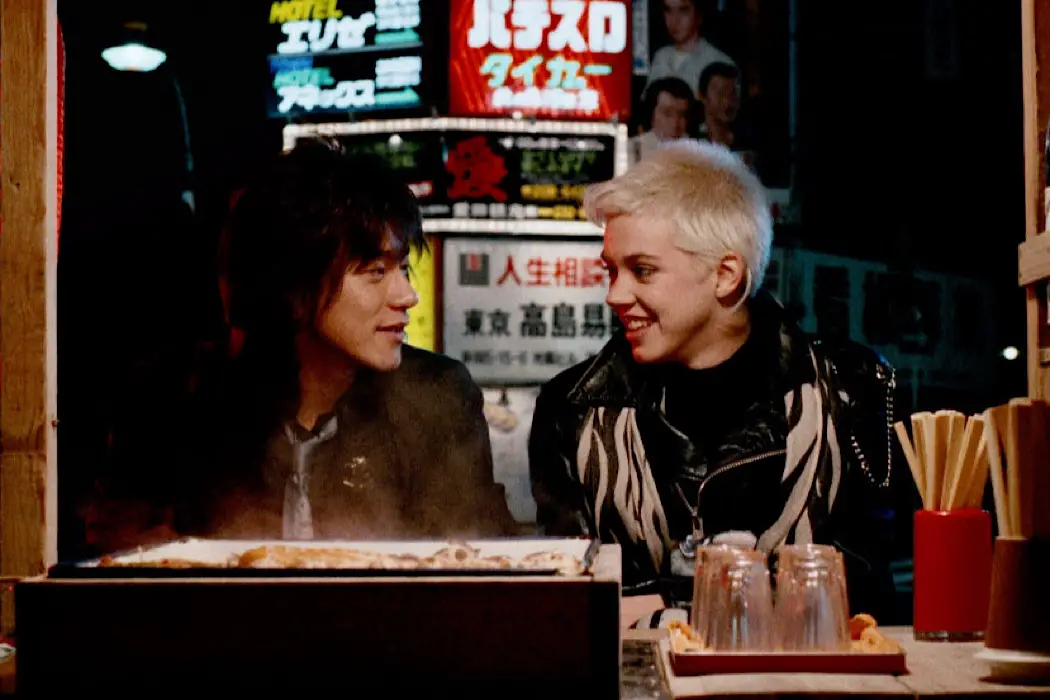TOKYO POP: Lost—And Found—In Translation

Lee Jutton has directed short films starring a killer toaster,…
Before Fran Rubel Kuzui directed the original film version of Buffy the Vampire Slayer in 1992 and embarked on a lengthy career as a film distributor, she made her feature filmmaking debut with Tokyo Pop, a colorful romantic comedy about an American singer (played by Carrie Hamilton, the daughter of Carol Burnett) trying to navigate Japanese culture and make it big in the Tokyo rock scene. Co-written by Kuzui with Lynn Grossman and produced by her husband Kaz Kuzui, the film was critically acclaimed upon its initial release in 1988 but has remained largely underseen since then. Now being re-released by Kino Lorber in a new 35th anniversary 4K restoration by Indie Collect (funded in part by Burnett and Dolly Parton), Tokyo Pop is a song-filled ray of sunshine that is more than worthy of being rediscovered by modern audiences.
Tokyo Drifter
Wendy (Hamilton, full of spunk and bleach) is tired of singing backup in male-dominated rock bands in New York, so when a friend sends her a postcard raving about life in Tokyo, she decides to make a fresh start across the Pacific. Needless to say, in an era before cell phone maps and mobile translation apps, Wendy’s sudden arrival in Japan doesn’t go smoothly, especially when she discovers her friend has moved on to Bangkok. She ends up bunking down in a goofy hostel for gaijin (foreigners) called Mickey House and getting a thankless job as a hostess in a karaoke bar—a far cry from the rock and roll stardom she dreams of. But when Wendy meets Hiro (Diamond Yukai, appearing alongside his real-life rock band Red Warriors), she discovers an unexpected new path to fame and glory.

Turns out, gaijin singers are all the rage in Tokyo right now, especially beautiful blondes like Wendy, so pairing her with Hiro is a recipe for instant success. (Their big hit is a corny but undeniably catchy cover of Do You Believe in Magic.) It also sparks an intense romance between the two singers, whose mutual attraction and passion for music overcomes the clash of cultures inherent in their relationship. Many of the best scenes in Tokyo Pop involve Wendy and Hiro navigating that clash, such as when Wendy asks Hiro why he never talks about himself (“we Japanese never talk about ourselves”) and when Hiro takes Wendy on a date to a historical Japanese shrine that, in his obsession with embracing American rock and roll culture, he failed to appreciate until seeing it through Wendy’s eyes.
Once More, With Feeling
Naturally, their moment of romantic and musical bliss cannot last; soon, Wendy grows tired of being little more than a gimmick, while Hiro longs to stop covering English-language hits and sing his own Japanese-language songs. Nonetheless, their love story leaves a lasting impact on them as well as the audience, especially as Wendy belts out an original song dedicated to Hiro over the closing credits. Hamilton, who passed away from cancer in 2002 at the far too young age of 38, has a remarkable screen presence that is matched by her throaty, emotional voice. Her singing is full of feeling, as is Yukai’s; when they stand together at the microphone, it’s all too easy to succumb to the gimmick yourself. They are young and in love, and that radiates from the screen; their energy is infectious, especially if you’ve ever felt that way yourself and want to bask in the warmth of those memories.

All Wendy wants is to be a rock star, yet the one thing that is capable of doing that for her in Japan—her appearance—tells her concert audiences nothing about who she really is as a person; in one of the film’s more hilariously awkward scenes, she’s recruited by a hard rock band to deliver a screeching metal rendition of Home on the Range, seemingly just because she’s an American. The same goes for Hiro, who assumes that his Japanese audiences have no interest in hearing a fellow Japanese sing songs about his feelings; they just want to watch him mimic other artists they already know. The struggle of Wendy and Hiro to stand out and apart from the pack and showcase their real talents is a universal tale, even if the particular setting of this story is incredibly (and delightfully) specific. The relatability and lovability of these characters are a large part of what makes Tokyo Pop so engaging; the script’s dialogue feels raw and real, just like them.
The film’s new 4K restoration looks wonderful, amplifying all of the bright lights and bold colors of Tokyo without excessively smoothing over the grit and grunge of the era. (After all, who wants to watch a time capsule of late 1980s youth culture that looks like it was shot today?) Every frame has something to catch the eye, even if it’s just Hamilton’s outfits—and she wears a lot of really cool outfits. I particularly loved the different love hotels where Wendy and Hiro would meet up for trysts; each one has an equally extravagant but entirely different decor, from luxuriously padded headboards that are fit for royalty to neon-hued pornographic pop art paintings. And while the dialogue levels are sometimes lower than I would have liked, Tokyo Pop is a film that thrives in its musical moments—including several cameos from other real-life rock bands—and those sound great.
Conclusion
Kuzui may have only directed a couple of features, but few filmmakers can say they’ve made a movie as fun, free, and ultimately bittersweet as Tokyo Pop.
Tokyo Pop opens in New York at BAM Rose Cinemas on August 4, 2023, and in Los Angeles at the American Cinematheque on August 11, 2023, followed by national expansion.
Watch Tokyo Pop
Does content like this matter to you?
Become a Member and support film journalism. Unlock access to all of Film Inquiry`s great articles. Join a community of like-minded readers who are passionate about cinema - get access to our private members Network, give back to independent filmmakers, and more.
Lee Jutton has directed short films starring a killer toaster, a killer Christmas tree, and a not-killer leopard. Her writing has appeared in publications such as Film School Rejects, Bitch: A Feminist Response to Pop Culture, Bitch Flicks, TV Fanatic, and Just Press Play. When not watching, making, or writing about films, she can usually be found on Twitter obsessing over soccer, BTS, and her cat.













